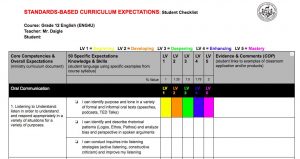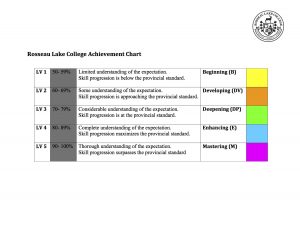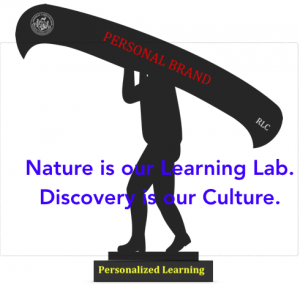STANDARDS-BASED CURRICULUM CHECKLISTS
A common criticism of PBL is because each student’s end product differs, connections to the ministry of education curriculum objectives suffer. It is often thought even more difficult for teachers to properly assess these types of projects because of this summative difference. This realization led teachers at RLC to develop Standards-Based Curriculum Checklists for our DISCOVERY DAYS inquiry-based projects initiative.
We have encouraged our faculty to choose exactly 50 specific curriculum objectives from the myriad of examples each ministry document gives for knowledge and skill building. Why 50? Because less than that would be difficult to properly cover each learning strand or unit and more than that would be next to impossible to teach within a regularly scheduled semester. As Rosseau Lake College also uses a Level 1-5 Achievement Chart, it is an easy move to create both a quality descriptive rubric, as well as one that could potentially act as the entire grade book in a competency-based system. The final touch with this easy-to-administer standards-based template is a column for reflection upon which both students and teachers can record conversations and observations and link to products. I have used this column as a formative feedback and reflection activity with my Grade 12 English class. Their role was to find examples from previous classroom lectures and activities to satisfy the potential mastery of each skill. Level 5 Mastery can be further enriched by co-constructing criteria around possible 90%+ “gamified” extensions of competencies (eg. real-world connections, ability to teach the material, etc.)
By incorporating student conferences with subject teachers early into the DISCOVERY DAYS schedule, students have the ability to directly link their partial or fully cross-curricular project ideas to specific curriculum objectives. A Google folder carrying the entire faculty’s curriculum checklists allows any student or facilitator the ability to easily locate aspects of a subject area to build projects upon.
This reflective component has so far proved crucial to maintaining academic rigour with PBL and in focussing students Discovery Projects on expected subject outcomes. It also has the added bonus of increasing student autonomy and voice-and-choice around interest areas. Resilience and flexibility have been a by-product of these check-ups as many students have had to “go back to the drawing board” if their culminating project ideas didn’t satisfy enough curriculum outcomes.
“More than one in 10 (12 percent) students educated at independent schools said they had been inadequately prepared for university. And the most common criticism was that they’d been given over-structured support at school and wanted to be more academically independent.” (Furedi, 2016)
Big thanks to former Cohort21 alum, Ed Hitchcock @ehitchcock @SciTeacherEd for his initial work in Standards-Based Grading (watch his video here). Also thanks to @egelleny for mentioning him to me in the first place. The Power of Cohort21!




So true! @ehitchcock is a great resource for this approach and the ‘why’ behind it. So glad that you connected with him on this. I think that your positioning of PBL is significant as well. You should check out the work of the Buck Institute – they are coming (back) to Hillfield this summer.
Thanks,
garth.
Hi @edaigle,
I really like your school’s standards based approach to assessment. What platform did you use the develop these grade books? I’m really interested to learn about how you have incorporated Discovery Days into the assessment for course standards. I went to the Hillfield Strathallan conference in the summer. It was similar to things I have done before in other inquiry PD, but they do have a coherent approach that might be easier to implement at a whole school level. As a Geographer, it has been my bread and butter since I started teaching.
With regards to your Discovery Days, how frequently are you planning to have them (you might have mentioned it earlier). I love the idea of flex time for students to pursue their passions – our students have really full course loads, so everything has to happen outside class time. It would be great if, similar to IB, students got to create / pursue a topic they were passionate about each year (similar to the AP Capstone / IB Personal Project and Extended Essay)
Maybe one day…
Thanks again,
Laura